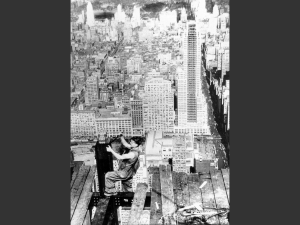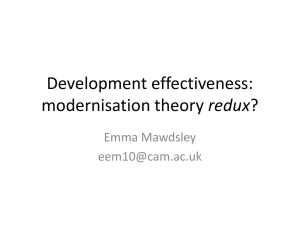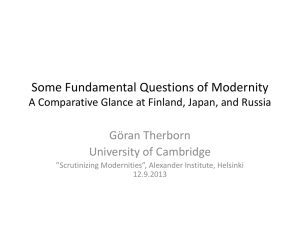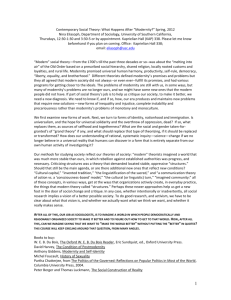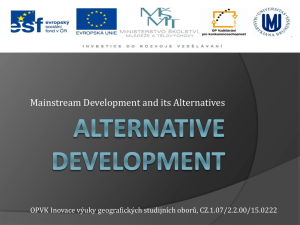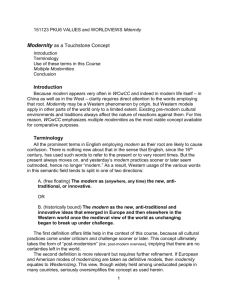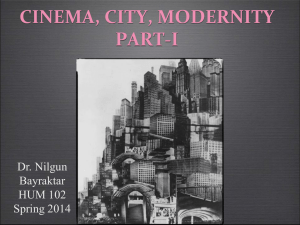Contribution_Final_Draft
advertisement
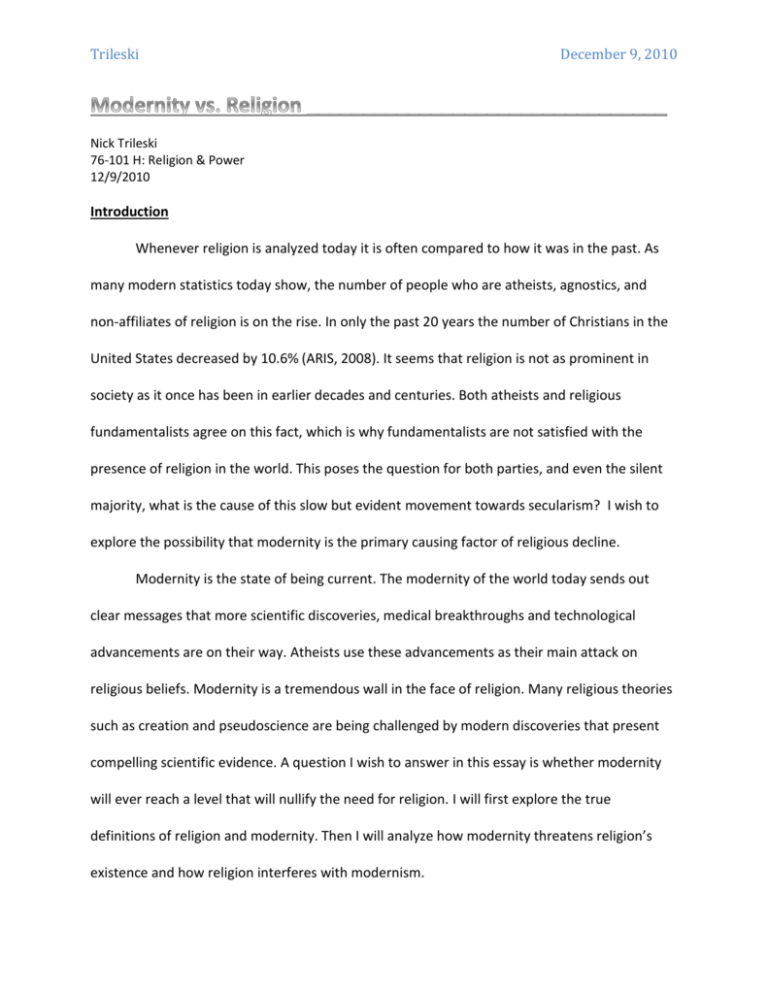
Trileski December 9, 2010 Nick Trileski 76-101 H: Religion & Power 12/9/2010 Introduction Whenever religion is analyzed today it is often compared to how it was in the past. As many modern statistics today show, the number of people who are atheists, agnostics, and non-affiliates of religion is on the rise. In only the past 20 years the number of Christians in the United States decreased by 10.6% (ARIS, 2008). It seems that religion is not as prominent in society as it once has been in earlier decades and centuries. Both atheists and religious fundamentalists agree on this fact, which is why fundamentalists are not satisfied with the presence of religion in the world. This poses the question for both parties, and even the silent majority, what is the cause of this slow but evident movement towards secularism? I wish to explore the possibility that modernity is the primary causing factor of religious decline. Modernity is the state of being current. The modernity of the world today sends out clear messages that more scientific discoveries, medical breakthroughs and technological advancements are on their way. Atheists use these advancements as their main attack on religious beliefs. Modernity is a tremendous wall in the face of religion. Many religious theories such as creation and pseudoscience are being challenged by modern discoveries that present compelling scientific evidence. A question I wish to answer in this essay is whether modernity will ever reach a level that will nullify the need for religion. I will first explore the true definitions of religion and modernity. Then I will analyze how modernity threatens religion’s existence and how religion interferes with modernism. Trileski December 9, 2010 What is Religion? WordNet at Princeton University defines religion to be “a strong belief in a supernatural power or powers that control human destiny”. However there is more to religion than beliefs of supernatural powers. When Mircea Eliade describes the meaning of the “sacred” in the introduction of her book The Sacred and the Profane: The Nature of Religion, she defines sacred meaning as an important aspect of religion. For example, the “Incarnation of God in Jesus Christ” (Eliade, pg. 11) might be one of the most sacred things that Christians believe in. The author calls these sacred things hierophanies. These infuse meaning into simple objects that may have no influence on a secular man. According to Eliade, heirophanies are the source of a religious man’s power. These are not necessarily supernatural powers but just additional meanings that religious people attribute to sacred objects. Other examples of heirophanies may include the cross, or holy ground. They may seem as just regular things to a secular man, but they hold a deep sacred meaning to a religious person. Karen Armstrong further explains this sacred meaning and belief in the introduction to her book, The Case for God. Armstrong starts her Introduction describing “hero stories” which were epic stories that described heroic and impossible events. These stories were incorporated into religious texts and were meant to inspire people about God’s greatness. Now they are just viewed as fictional stories that hold no meaning. Armstrong refutes this point by saying that these stories were never meant to be viewed as valid events that people should respect God for, but as just inspirations with transcendental meaning. The author references Zhuangzi, an influential Chinese theologian, who believes that a “knack”, a transcendental and innate Trileski December 9, 2010 meaning is the fundamental concept of religion. This “knack” causes religious people to come together to worship and have faith. So to conclude the complex and multi-faceted definition of religion, many different theologians define religion in different ways. However, most can agree that religion infuses meanings into objects and events that only religious people can feel. It is those meanings, those transcendental and sacred attributes that define religion, cause people to worship and have faith. Modernity Modernity is “the quality of being current or of the present “(WordNet, Princeton University). It is impossible to turn on the news today without hearing something about the state of our country’s modernity. In fact, that’s what the news is generally for, to inform us about the current state of modernity. In the past years and especially in the past decades, our state of modernity has dramatically changed. The world as a whole is becoming more technologically advanced. More scientific discoveries have been made. And medical care has exceeded past precedents. Everyone can agree with this. Most people agree that our society is constantly achieving new discoveries that may help make our lives easier. “Modernity exists in the form of a desire to wipe out whatever came earlier, in the hope of reaching at least a point that could be called a true present, a point of origin that marks a new departure.” (Paul de Man). Paul de Man suggests that modernity is always present, it always tries to make something better and it will never cease. The United States is a prime example of a country that is leading the way and setting the precedent for modernity. Discoveries of new galaxies, medical breakthroughs in the fields of Trileski December 9, 2010 oncology and optics, and technological wonders of companies such as Google and Apple all attribute to our modern and current state. For example, in the past couple decades NASA has explored Mars and found traces of water. They also discovered that the universe is expanding due to red shift, “a shift in the spectra of very distant galaxies toward longer wavelengths toward the red end of the spectrum” (WordNet, Princeton University). Medical discoveries such as bionic eyes for the blind, and Ribonucleic acid interface that attacks malign cancer cells are all definitions of modernity. Now that we know the concepts behind religion and modernity, we will venture to find how the two interfere with each other. But first what’s at stake here why does it matter? Modernity and religion are integral parts of our world today and knowing how they interact is key to knowing how our world today functions. How does Religion interfere with Modernity? In my life I have one specific incident which really shined the light on how religion opposes the state of being current. Back when I lived in Brooklyn, New York, I would often get groceries for my mom a few blocks from our apartment. One day when I was walking back with the groceries through a Jewish neighborhood, a lady called out to me, “Hey can you come inside for a second?” She came outside and said, “We need someone to turn off our air conditioner”. It was quite a chilly day in the beginning of June and they must have left it on from the previous night. I asked “Why can’t you do it yourself?” and she responded “Well, because it’s Sabbath”. I went inside, hit the off switch, while glancing at the kids wearing sweaters in June, and didn’t ask another question. When I got home I asked my mom about Sabbath and she explained it to me. To this day I have Trileski December 9, 2010 seen that incident as an archaic practice impeding on the current state of our world, our modernity. This story really shows that God is not “imprisoned in the temples” (Heschel, 486) but is actually prevalent in society. It also shows that God’s presence is some aspects of society is somewhat detrimental to modernity. If no one walked down that street those kids sitting in the living room could have possibly gotten a cold just because their religion forbade them to turn off an air conditioner. Chris Hitchens takes my argument even further to say that “religion poisons everything; It must seek to interfere with the lives of nonbelievers, or heretics, or adherents of other faiths.” (Hitchens, pg. 17) For example, he cites a church in Ireland trying to keep divorce illegal, even for non-Christian denizens. Divorce is an example of our modernity; it is now more popular and accepted than it was before. A church trying to dissuade and prevent people from divorcing is clear evidence that religion interferes with modernity. Even the relatively modern movement of anti-terrorism was refuted a reverend who said, “The immolation of their fellow creatures was a divine judgment on secular society that tolerated homosexuality and abortion” (mentioned by Hitchens, pg.32). It’s clear that religion opposes secular and modern society in a big way. The main reason for this opposition and interference is because religion feels genuinely threatened by modernity. Modernity’s threat on Religion Modernity must pose some threat on religion since religion aims to fight modernity. Modernity often associates itself with the secular society of the world. “The basic assumption of the secular society is that modernity overcomes religion.” (Ulrich Beck) Beck says that Trileski December 9, 2010 modernity is a threatening to religion, and therefore religion attacks modernity and secular society. So what are some of the reasons for this threat? As many atheists argue, science disproves many religious beliefs. For instance a number of centuries ago people used to literally think of the skies as the heavens. They used to think that somewhere in the sky was god’s kingdom. However in more modern times we have figured out that there are galaxies and different planets outside the earth, and religion quietly adapted its views to define the heavens as a transcendental essence which cannot be seen. Religion’s miracle cures are also threatened by current advances of medicine. People no longer have to pray to get well, because there is medicine that is designed to do just that. Modernity is a threat to religion’s popularity and presence in today’s modern society. As long as new discoveries by NASA and by research doctors are happening religion is on a steady decline. People start losing interest in having faith in something that doesn’t provide them with much in return. The ARIS survey conducted by Trinity College concluded that there has been a 10% decrease in the number of Catholics in America in the past 20 years. People are losing interest in religion and it’s because of modern advances in the sciences that makes society safer and more advanced. Prospects of Modernity

